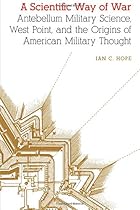

Since the Pikes Peak gold rush in the mid–nineteenth century; women have gone into the mountains of Colorado to hike; climb; ski; homestead; botanize; act as guides; practice medicine; and meet a variety of other challenges; whether for sport or for livelihood. Janet Robertson recounts their exploits in a lively; well-illustrated book that measures up to its title; The Magnificent Mountain Women. Arlene Blum provides a new introduction to this edition.
#802036 in Books Hope Ian Clarence 2015-08-01Original language:EnglishPDF # 1 9.00 x .94 x 6.00l; .0 #File Name: 0803276850350 pagesA Scientific Way of War Antebellum Military Science West Point and the Origins of American Military Thought
Review
2 of 2 people found the following review helpful. Better War Through Science!By John HamillThe conduct of war is sometimes described as a science; other times as an art. In "A Scientific Way of War"; Ian Hope describes the origin of West Point and the US Army and their foundation in Enlightenment ideals. Eighteenth century French military education focused on math as it was thought to not favor one social class over another and was more egalitarian as a result. Based on the French model; West Point focused on math; science; and engineering. The underlying philosophy was that war could be completely understood through science; and through the application of scientific principles; chance in war could be eliminated. The West Point education was thought to be a better system as it would develop competence throughout the army rather than rely on the genius of a few; which was the British system. The use of geometry in studying operations goes along with the Enlightenment philosophy; but the author shows that Jomini was not as influential in America as other writers who also incorporated geometry into their works. Unlike European military academies; West Point provided cadets a thorough military education over four years of coursework rather than the two years common elsewhere; and West Point prepared students for high command. Although the US Army had no German style General Staff; US Army officers were educated in all combat arms and were prepared to plan large wars as the general officers that many of them became. So the US Army was much more professional than it is often portrayed.It is an interesting read and an original topic; and the writing is very good. Although the author compares the Enlightenment origin of US Army thought with the more Romantic inspiration for the Prussian system; it would have been nice to read much more along these lines as well as a discussion of differing philosophies of command. The science of war after the Civil War gets only a page or two; which is unfortunate; because the 'scientific way of war' continues to this day. The author does not discuss any disadvantages of this 'scientific way of war' and dismisses Clausewitzian influence without any backup; which is unfortunate. Despite this; the book is well worth reading and is a valuable addition to my library. It is one of the best books that I've read this year.1 of 1 people found the following review helpful. Toward an “American†Way of WarBy A. A. NofiA summary of the review on StrategyPage.Com:'Author of two works on the Afghanistan War; Canadian Army officer and professor at the Royal Military College of Canada here gives us a thoughtful analysis of the rise of professionalism in the American Army and development of an American way of war. After a brief survey of American war-making in the colonial period and the early Republic; he examines the impact of the War of 1812 and the subsequent military reform; implemented primarily through intellectual evolution of instruction and curriculum at West Point. He then looks at the role of the Corps of Engineers in internal improvements; Jacksonian military ideas; not all of them good; the role of the new “Military science†in the Mexican War and the war’s influence on further evolution of American ideas. Hope follows with a look at the state of the U.S. Army’s military thought on the eve of the Civil War; reflecting a distinctly American way of war attuned to and influenced by American experience. The final chapter address the impact of these ideas on the Civil War and its evolution during that conflict. This is a somewhat iconoclastic view of the rise of an American way of war that should be read by anyone interested in American military thought.'For the full review; see StrategyPage.Com0 of 2 people found the following review helpful. Kindle edition way overpricedBy A Forest FanI read the interview with historian Ian C Hope in this month's issue of "Civil War Times". I eagerly came to to see what the Kindle edition would be priced at. Um; $52 for a kindle book on military science? Let me know when it is $2.75; please.